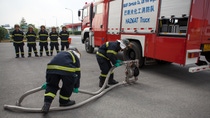Health matters
A historical document indicates that on December 3, 1866 – only one year after the founding of the company – Dr. Carl Knaps was hired as the first industrial physician at BASF. This date also marks the birth of the first occupational medical service in the chemical industry in Germany – long before legal obligations were introduced.
Nearly 150 years ago, Dr. Knaps’ mission was to assure the best protection of life and health possible for BASF employees. Until today, this plays a central and primary role in BASF’s corporate policy, as it has in the past.
"In China, BASF is at all efforts to care about employees’ occupational health conditions – some measures we take, for example, can influence the purchase of the office supplies or even drive the adjustment of the production lines,” said Janice Chen, Country Coordinating Occupational Health Physician, Responsible Care Greater China, BASF. Having worked for 12 years in the medical service system in the chemical industry, Chen deeply understands the importance of occupational safety and health for a chemical company.
“How to timely discover and handle employees’ health problems and how to protect them from the hazards are of top priority for BASF.”
Janice Chen, Country Coordinating Occupational Health Physician, Responsible Care Greater China, BASF

"Chemicals are a special kind of harmful substances. They are of high risks and may invade our body through various means to cause short-term or long- term impacts on health. How to timely discover and handle employees’ health problems and how to protect them from the hazards are of top priority for BASF,” said Chen. She also disclosed that during the company’s three decades of operation in China, no case of chronic occupational disease has been reported.
It mainly owes to BASF’s well-established Occupational Medicine and Health Protection system, which focuses on all aspects beneficial to employees’ occupational health through versatile measures from disease prevention, medical examination, diagnosis and treatment, first aid to health promotion campaigns. Besides strict compliance with laws, regulations and standards set by local governments and the industry, the company continually assesses and improves the environments and processes at all production sites around the world in accordance with BASF Health Performance Index (HPI).
“Regular medical examination and assessment are the most direct and effective ways to understand the health conditions of our employees,” said Chen. According to her, BASF provides customized examination programs to employees at different job positions, followed with timely treatment when discovering any problems or potential risks, to maintain or improve their health conditions and productivity. In 2013, almost all the operational staff participated in the occupational medical examination, while participation rate of health examination for office staff increased to 85%.
Apart from providing the traditional medical services, Chen and her team also play an active role in other areas related to occupational health. At a BASF site, a packaging assembly line has been effectively improved within a short period, as a Responsible Care assessment participated by Chen found the unbalanced working time of workers in two production lines. After discussions, the site increased the investment in small packaging production line to meet the market demand, while reasonably reducing the labor intensity of some operators.
“Environmental and process planning, monitoring and improving are the focuses of industrial hygiene. We participate in the early planning stage of new production sites and regularly check the safety conditions of the sites and labor working time,” said Chen. “Such Level One prevention efforts also apply to employees working in the office.”
In 2012, BASF Greater China’s new Headquarters building was completed at the Pudong site, Shanghai. Before that, Chen and her team participated in the design of the office area. “Working environment has a direct impact on employees’ productivity and health conditions. Friendly environment and suitable furniture help effectively prevent cervical spondylosis, vision loss and other health problems,” explained Chen. She also introduced that workspaces, furniture heights and comfort-of-use were specially considered. This set of office space design standards is also applicable to the other new office buildings in Greater China.
60% employees at BASF Greater China are between 26 to 39 years old, mostly the backbone of their families. Their health, both physical and mental, is extremely important for their families. In 2013, BASF launched the Employee Assistance Program (EAP) in China to provide mental health counseling for employees and their family members. Through the 24/7 toll- free hotline, they can seek for counseling on emotional and psychological problems anonymously from professionals.
“We need to respect and support the occupational health needs of every employee to ensure their productivity and creativity,” said Felix Hu, Head of Responsible Care Greater China, BASF. "Therefore, Occupational Medicine and Health Protection is an important part of BASF’s Responsible Care Management System. Besides caring for our employees, we are also concerned about the occupational safety of our suppliers and contractors, so as to maintain productivity with our value chain partners.”
Protection within reach
At BASF, Occupational Medicine and Health Protection measures are not just executed by Janice Chen and other medical personnel, but also by hundreds of well-trained first- aiders within the company. They are everywhere at BASF’s sites in Greater China who can implement professional first aid measures in real time at emergencies.
The company also provides global travel medical and emergency consultation to employees on business trip, while providing information about the destination country and possible health hazards, medical examination and travel medical kit and other medicine.
